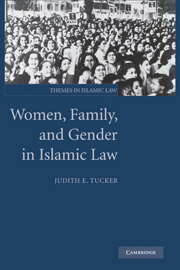Book contents
- Frontmatter
- Contents
- Acknowledgements
- Maps
- 1 Introduction
- 2 Woman as wife and man as husband: making the marital bargain
- 3 Woman and man as divorced: asserting rights
- 4 Woman and man as legal subjects: managing and testifying
- 5 Woman and man in gendered space: submitting
- 6 Conclusion
- Glossary
- Bibliography
- Suggestions for further reading
- Index
2 - Woman as wife and man as husband: making the marital bargain
Published online by Cambridge University Press: 05 June 2012
- Frontmatter
- Contents
- Acknowledgements
- Maps
- 1 Introduction
- 2 Woman as wife and man as husband: making the marital bargain
- 3 Woman and man as divorced: asserting rights
- 4 Woman and man as legal subjects: managing and testifying
- 5 Woman and man in gendered space: submitting
- 6 Conclusion
- Glossary
- Bibliography
- Suggestions for further reading
- Index
Summary
I begin with the topic of marriage because Islamic law privileges the marital bond. In the canonical legal treatises and collections of fatwas, in court proceedings, in the minds of reforming jurists, and in the priorities of today's female activists, marriage occupies a central and pivotal place. Jurists, reformers, and activists have studied and elaborated on the rules for contracting a marriage, and the rights and obligations of husbands and wives once married. Most jurists devoted considerable proportions of their general works to issues pertaining to marriage, and often gave the topic pride of place right after the discussions of religious ritual with which they open their treatises. The courts, at least in the eras for which we have evidence, registered many marriage contracts and provided a venue for litigation about marital rights. The reform-minded intellectuals of the modern period focused on abuses in marriage as a key target of criticism and revision. And, in recent times, activists have looked to the marriage contract itself and the definitions of male rights within marriage as particular targets for legal campaigns.
How can we understand the centrality of marriage in Islamic legal discourse and practice? The answer lies, in part, in the Qurʾan and the hadith, the primary and revered sources of the law. Marriage is presented in the Qurʾan as a major source of comfort and joy for both spouses, for men are told about their wives in lilting metaphor: “they are a vestment for you and you are a vestment for them” (2:187); and both men and women are informed that “He created for you, of yourselves, spouses, that you might repose in them, and he has set between you love and mercy” (30:21).
- Type
- Chapter
- Information
- Women, Family, and Gender in Islamic Law , pp. 38 - 83Publisher: Cambridge University PressPrint publication year: 2008

